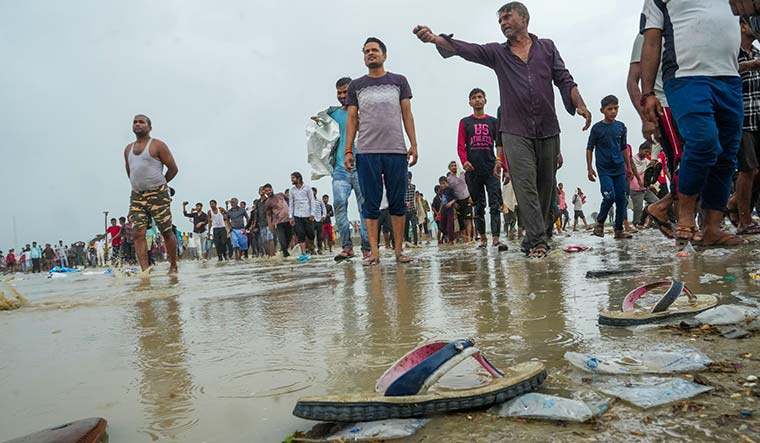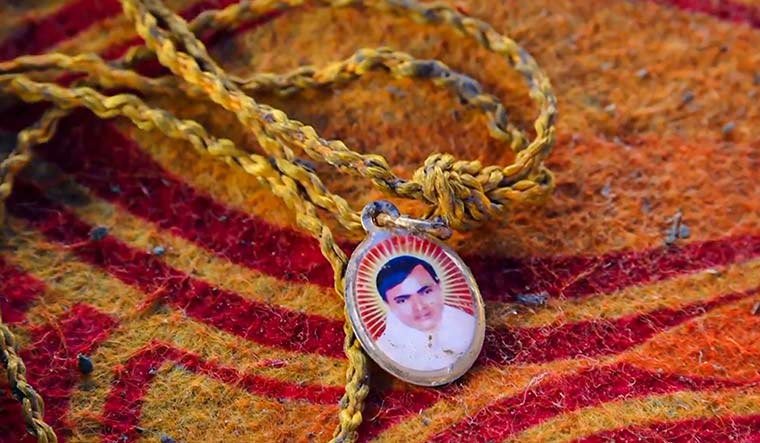Rock legend Bruce Springsteen would not have heard of Hathras when he quipped at a concert years ago: “Blind faith in your leaders, or in anything, will get you killed”.
‘The Boss’ could have been talking about politicians. But an Indian godman, with a besotted following in the country’s most populous state, and in the world’s most populated country, is no less a magnet for “blind faith”.
India has always been fertile ground for godmen. But with startling regularity, many of them have been making their way into headlines for, not spiritualism, but for crimes ranging from tax evasion to murder.
‘Bhole Baba’ Narayan Sakar Hari is just the newest guru on the block.
On July 2, in a newly cleared maize farmland in Uttar Pradesh’s Phulrai Mughal Garhi in Hathras―next to the busy National Highway―121 lives (112 of them women) were snuffed out.
Their bodies, later taken out in trucks and tractors, had been crushed under a sea of humanity as a stampede broke out with followers rushing to scoop up the dust where ‘Bhole Baba’ had treaded minutes earlier. The dust was believed to be blessed with curative properties.
Dr Surya Prakash, chief medical superintendent at the Hathras civil hospital, about 30km from the stampede site, told THE WEEK: “Our hospital reported 34 dead. Most of them from asphyxia or suffocation.”
The FIR filed at the local Sikandrarao police station said that while about 80,000 people were expected to attend the satsang (religious congregation), 2.5 lakh turned up. This led to a frenzy, some time after 2pm, as screaming men, women and children tried to get out.
Eyewitnesses said many more than 2.5 lakh had showed up. Kailash Yadav, who has been plying his ramshackle auto-rickshaw in the area for a decade, said: “It must have been about five lakh at least. For three to four kilometres, the highway on both sides of the venue was full of people.”
Inevitably so, from that day, the baba captured the public imagination. News channels, newspapers, websites and YouTube channels have been running stories about his life, lifestyle and connections, with the odd conspiracy theory thrown in.
Originally hailing from a village in Bahadurnagar in the state’s Kasganj district, Bhole Baba, whose real name is Surajpal Singh, joined the state police as a constable, and later became head constable in the local intelligence department called the ‘Special Branch’.
 Tragic gathering: People at the scene of the stampede, a day later | PTI
Tragic gathering: People at the scene of the stampede, a day later | PTI
Shalabh Mathur, inspector general (Aligarh Range) told THE WEEK: “He took voluntary retirement while serving in Agra in 2000. We have traced two FIRs in his name. One was in Agra, where the charge against him was on claiming magical powers to cure [diseases]. He was acquitted. The other FIR was from Rajasthan’s Dausa for violating lockdown rules during the Covid-19 pandemic. We are trying to find out if more cases have been filed against him.”
It has been quite a dizzying rise for the former constable. He has gathered immense wealth including landed property, houses and a cavalcade of luxury cars. He has also increased manifold his number of followers, thereby enhancing his clout.
So much clout, in fact, that legal requirements and permissions from local authorities could be ignored. A serving inspector general-level officer told THE WEEK on condition of anonymity: “Basic rules of crowd management were absent. If you see the television visuals and pictures, there were no gangways or any proper segregation. All the management was ad hoc. Even for the police, anticipation of the size of the crowd is a must. If you are giving permission, you have to regulate. Why were the police outside the venue while private security enforced rules inside?”
This private security is a army of sewadars, or helpers. Wherever his cavalcade goes, it is always escorted by a band of sewadars on Bullet motorcycles.
There are several categories in this group―some are dressed in pink, some in commando-style dungarees in black and some in camouflage. But almost all of them are armed with lathis.
Bhole Baba’s setup is managed by his ‘Shri Narayan Hari Sakar Charitable Trust’, which has set up district and lower-level committees that organise the logistics whenever a satsang or similar event is to be held.
While his main base is in the sprawling ‘five-star’, 21 ‘bigha’ ashram called ‘Prawas Ashram’ in Mainpuri, unconfirmed reports speak of several other ashrams in Kanpur, Bahadurnagar, Etah and other places across the state. While his personal preference is said to be a white Fortuner, he maintains a whole range of high-end luxury cars. Also, unlike the flowing saffron robes of other godmen, he wears a white three-piece suit and shoes, along with shades, for his satsangs.
A special investigation team set up to probe the stampede submitted its report to the state government on July 8. According to sources privy to the report, it has blamed the local organisers and pointed to the lack of adequate arrangements by the police. The report has also not dismissed the possibility of a conspiracy and has sought a deeper probe. Interestingly, it also pointed out that the police were prevented from discharging their functions by the organisers of the event.
A new twist in the case came with the Rajasthan connection. About six months ago, a Rajasthan Police team, while conducting a raid on the house of Harshvardhan Meena, found that Bhole Baba was staying there.
Meena is the main accused in the Rajasthan 2020 Junior Engineer Exam (JEN) paper leak case.
Additional Director General of Police (Special Operations Group) V.K. Singh told the media: “In January, we raided Meena’s house in Dausa in connection with the paper leak case. But before we reached, the baba, who was staying there, ran away.”
Bhole Baba had reportedly attended satsangs organised in Meena’s Dausa house.
Said Mathur: “It is too premature to say anything now as investigations are on. But the scope of investigations would look into his (Bhole Baba) wealth status, the kind and amount of property he holds, the money trail, and how funding is taking place. There will also be an investigation into a conspiracy angle on whether the tragedy was pre-planned in any manner or was accidental”.
A point that feeds the conspiracy angle is the fact that while the followers were exhorted to touch the dust where the godman walked, they were then forced back with ‘lathis’ by his private security. “That is a definite contradiction,” said the IG-level officer. “Did they want the people to rush in to touch the dust? [If so, why were they] suddenly forced back by the preacher’s security, creating chaos and mayhem. This should be probed.”
While Bhole Baba’s rise might have been meteoric, he had maintained a low profile for long. He did this by making sure he was not photographed or caught on video.
Said Monu Yadav, a youth from a nearby village who was present at the stampede site: “The sewadars kept a strict eye on anyone trying to record the event on phone. I had tried calling up many of my friends but the phones were not connecting.” The local police denied that phone jammers were used.
A day after the tragedy, the site was found littered with wedding cards ostensibly brought for the baba’s “blessings”, feeding bottles for babies, vanity boxes and women’s apparel.
This was because of the baba’s massive appeal among women. Godmen often tout their own USP in their preaching. In this case, it was Bhole Baba’s much-touted ‘powers’ to cure infertility, women’s diseases and sick children, and to get grooms for unmarried women.
While Bhole Baba’s followers are made up of quite a few dalit communities, they are overwhelmingly Jatavs. A scheduled caste community, Jatavs account for about 10 per cent of Uttar Pradesh’s population and more than half of the state’s 2.25 crore dalits, making them a huge electoral constituency. The baba also belongs to the community.
Burdened by poverty, socio-economic deprivation and a lack of health care, a section of the community is sometimes forced to look for an escape route to solace, emotional comfort and quick-fix solutions for health issues.
Moreover, with the traditional joint family system and close kinship ties giving way to nuclear families even in rural Uttar Pradesh, there is often no socio-economic support system to address problems. These are circumstances ripe for exploitation.
So strong is the belief in Bhole Baba’s magical powers that his parting words before leaving the July 2 satsang―’Aaj pralay aayega (there will be a catastrophe today)’ has been taken as “proof” of his “mystic powers”.
Predictably, Bhole Baba has become a political hot potato, and a blame game has erupted among the state’s political parties. They are accusing each other of linkages and siding with the preacher.
While Bhole Baba might be elusive at the time of this article going to print, he did express his sadness to a news agency and, in the video, exhorted his followers “to keep faith in the government and administration”.
That a news agency could locate the godman while the police keep up their frantic hunt could well be a metaphor for the dark state of affairs. For his devoted followers, it could even be “Baba’s leela (divine play)”.


